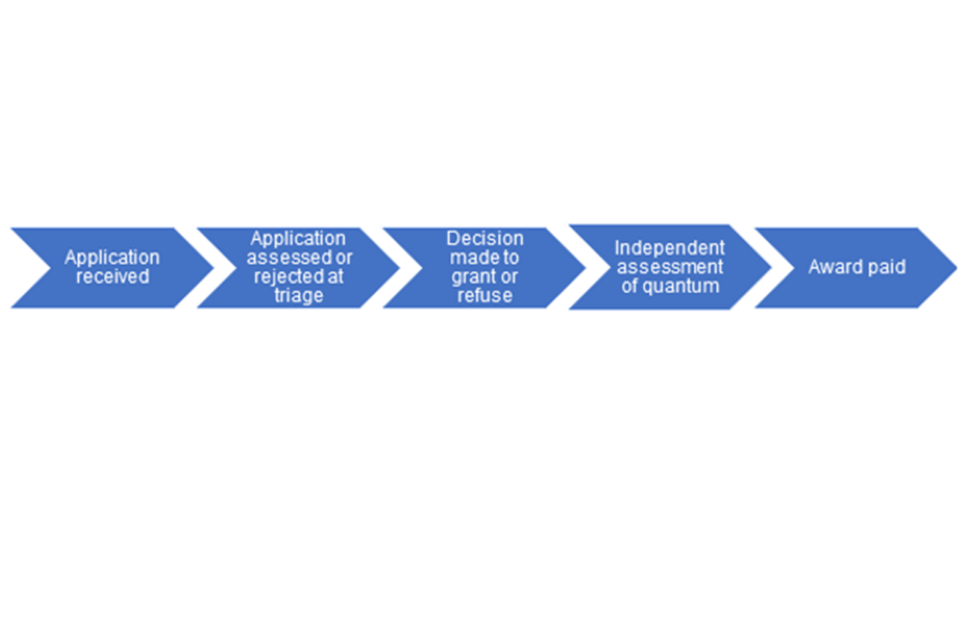Miscarriage of Justice application service (MOJAS) claims Management Information
Updated 7 August 2025
Applies to England and Wales
1. Miscarriage of Justice statistics:
1.1 Introduction
The Secretary of State has a statutory duty to decide whether to award compensation to someone who has suffered a miscarriage of justice in England and Wales, in line with the test set out in section 133 of the Criminal Justice Act 1988.
There is no automatic entitlement to compensation and the Miscarriages of Justice Application Service is just one route in which an individual can receive compensation for a wrongful conviction, with other options including making a civil claim. More information on applying for compensation can be found at MOJAS.
This report provides an overview of applications received and all decisions made on applications in the period between April 2016 and March 2025. Data from earlier years have not been included as it was not collected on a consistent basis, meaning it is not directly comparable with the latest periods. The information and data presented here and in the accompanying documents (available here: Miscarriage of Justice application service (MOJAS) claims Management Information - GOV.UK ) should be considered as management information presented to give one coherent version of these statistics.
Necessarily some applications will still be in progress at the point that the statistics were collated for publication and so not all applications captured in the data will have completed all stages of the process.
1.2 Rationale for publishing
This publication provides an overview of statistics on applications received and all decision made for miscarriage of justice applications from April 2016. Data for April 2024 to March 2025 has been added to the previously published data series.
The department is releasing the figures following public interest in the subject and requests made following media coverage. The publication of these statistics provides a coherent set of publicly available data. The publication will provide equal access in line with the data requested by the public and with the Code of Practice for Statistics which states, “Statistics and data should be equally available to all, not given to some people before others”.
1.3 Coverage
The report relates to financial years from 2016/17 to 2024/25. Data from earlier years have not been included as they were not collected on a consistent basis, and the quality of the data is not adequate for publication. The report covers the journey of compensation cases, the total amount paid, and the time taken to reach key stages:

1.4 Summary of findings
In 2024/25
-
103 applications for compensation were received. 27 applications went on to a full assessment to be considered against section 133 criteria and 77 were rejected at triage.
-
Of those rejected, over half (52%) were rejected as there were no convictions or the conviction was not quashed. See Table 4 for a detailed breakdown of reasons for rejection at triage.
-
£95,250 was paid in compensation which does not include interim payments. Any interim payments made in this financial year will be included in the financial year in which the final payment is made.
-
The median time between application received and outcome known in 2024/25 is 39 weeks. This is 4 weeks faster than it took last year (See Table 3).
Between 2016 and 2025:
-
The Ministry of Justice has paid £2,475,918 in compensation under the Miscarriage of Justice Application Service in the period between 2016/17 and 2024/25.
-
The amount paid ranges between £250 and £500,000. Over the period, 694 applications for compensation for a miscarriage of justice have been received.
-
From April 2016 to March 2025, 162 applications went on to a full assessment to be considered against s133 criteria and 538 were rejected at triage.
1.5 Explanatory Notes
-
The Ministry of Justice encourages applicants to include relevant documents with their application, but it is often the case that applications are received with no supporting documents, and it can take between 4 and 12 weeks to gather court documents so that the case can be fully assessed.
-
An application will pass through triage and will be assessed by a caseworker against section 133 criteria if the applicant:
-
Had a criminal conviction
-
The conviction was quashed at an out of time appeal
-
The application was made within 2 years of having their conviction quashed or being pardoned
-
An application will be rejected at triage if they do not meet one of the section 133 criteria. Examples include where an applicant has been acquitted at trial or a section 142 case where the case is reopened and an error rectified at the Magistrates’ Court. An application can also be withdrawn if an applicant has reached a full and final settlement elsewhere for the same matters arising from the same set of circumstances, and the principles of double recovery will apply.
-
All applications that pass through triage are then assessed by a caseworker who will consider if a person has had their conviction reversed or pardoned on the ground that a new or newly discovered fact shows beyond reasonable doubt that they did not commit the offence, and the non-disclosure of the new or newly discovered fact was not wholly or partially attributable to them.
-
When an applicant is notified that the test has been met, they are given up to 3 months (which can be extended) to gather supporting evidence to quantify the losses arising from the miscarriage of justice. The amount of compensation is determined by an Independent Assessor appointed by the Secretary of State.
